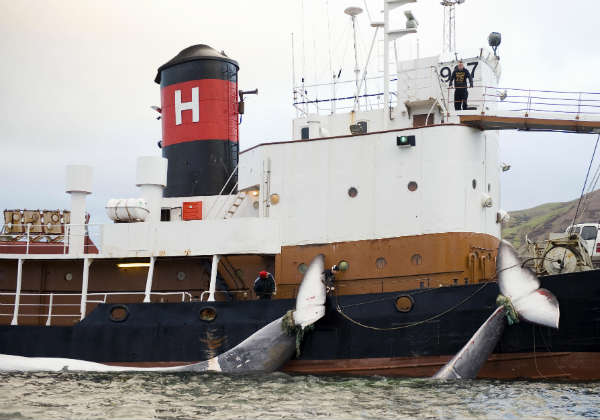
An Icelandic whaling ship Credit: AFP
Commercial whaling has been banned since 1986, but some still flout international standards by hunting the animals. Japan gets nearly all the attention—and the reality TV shows—in part because it usually takes more than 1,000 whales a year, but it’s not alone. Both Norway and Iceland also hunt a few hundred whales commercially, mostly for domestic consumption, though Iceland also exports whale meat to Japan. Norway and Iceland never signed off on the commercial whaling ban and don’t consider themselves bound by it, and Iceland resumed commercial whaling in 2006, while Japan claims it needs to hunt whales for scientific research. Anti-whaling nations like the U.S. and Australia have pushed to closed loopholes in the annual meetings of the dysfunctional International Whaling Commission without much luck so far, and each year the hunts continue.
Yesterday, though, the White House took a half-step forward on whaling, at least with one country. President Obama ordered the State Department and Commerce Department to keep Iceland’s whaling activities under review, and again urged the government in Reykjavik to end the practice. From theletter to Congress:
Iceland’s actions threaten the conservation status of an endangered species and undermine multilateral efforts to ensure greater worldwide protection for whales. Iceland’s increased commercial whaling and recent trade in whale products diminish the effectiveness of the IWC’s conservation program because: (1) Iceland’s commercial harvest of whales undermines the moratorium on commercial whaling put in place by the IWC to protect plummeting whale stocks; (2) the fin whale harvest greatly exceeds catch levels that the IWC’s scientific body advised would be sustainable if the moratorium were removed; and (3) Iceland’s harvests are not likely to be brought under IWC management and control at sustainable levels through multilateral efforts at the IWC.
More from TIME: Could Lifting the Whaling Ban Save the Whales?
Obama’s action will put more diplomatic pressure on Iceland, but it falls far short of what the President could do if he wanted. Under the Pelly Amendment, countries that violate global fisheries conservation agreements—like the IWC’s commercial whaling moratorium—can be subject to economic sanctions. But in his message to Congress Obama specifically forswore that option, at least for now.
Environmentalists were happy with Obama’s move, but naturally wished he’d done more, as Taryn Kiekow of the Natural Resources Defense Council put it:
We appreciate the President’s direction that federal agencies “keep the situation under review” and report back in 6 months or “immediately upon the resumption of fin whaling by Icelandic nationals.” We believe this sends a message that the United States will immediately reconsider a stronger response should Iceland resume fin whaling.
Although we believe the President should have imposed tougher sanctions now, his actions today confirm that the United States is prepared to intensify its response if the measures directed today prove inadequate.
We strongly urge the Obama administration to respond with hard-hitting sanctions should Iceland resume its slaughter of fin whales next season.
More from TIME: Saving the Whalers
Iceland may be a unique case—the country has a fairly limited domestic market for minke whales, so the country can’t make the easy case that it is engaging in traditional subsistence hunting. (Native groups in countries like the U.S. and Canada are allowed to take some whales as part of subsistence whaling despite the IWC moratorium.) Iceland restarted its whaling program with the hope of creating an export market in Japan—even though that nation tends to hunt far more whale than its people really want to eat. (It’s notable that after the tsunami this spring, Iceland cancelled its fin whale hunt.) Maybe diplomatic pressure will be enough to halt Iceland’s hunt.
I doubt it, though. Until anti-whaling nations like the U.S. show themselves willing to use economic sanctions, it’s easy for whaling countries to resist. Moral suasion can only go so far—especially because no country likes being told what to do by outsiders. Ultimately any real change is going to have to come from within the whaling countries themselves—and there is some evidence that many Japanese, at the very least, are tiring of the whaling controversy. Help isn’t likely to come from the IWC—the body is widely considered corrupt and ineffective, its ban full of loopholes. An effort led by the U.S. last year to broker a deal at the IWC—allowing Japan to resume official commercial whaling in the short-term while reducing the total number of whales being harvested—met with failure. Saving the whales is apparently one more thing that international institutions can’t seem to do. Let’s hope President Obama can be more persuasive.
Bryan Walsh is a senior writer at TIME. Find him on Twitter at @bryanrwalsh. You can also continue the discussion on TIME’s Facebook page and on Twitter at @TIME
More from Ecocentric: Why Fukushima is Good for the Whales (in Iceland)


